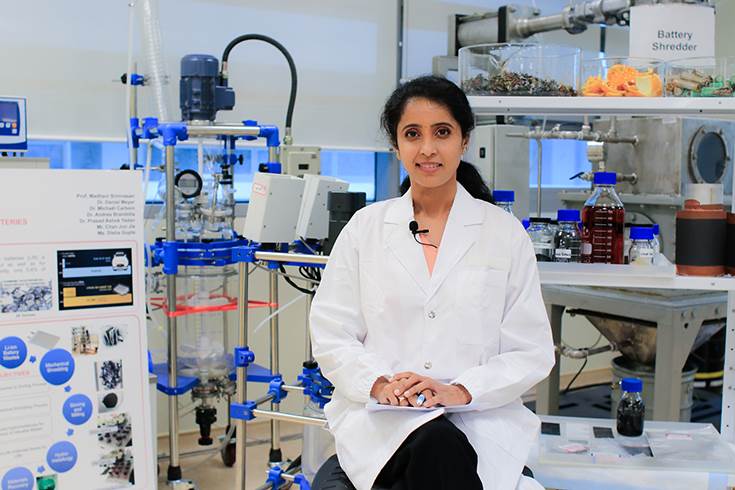The Sustainability Office at the Nanyang Technological University (NTU), Singapore has developed a new methodology to recycle and extract up to 95 percent of a lithium-ion battery’s critical elements, by using an eco-friendly, low-heat process that relies on food waste.
The process which utilises fruit peels of leftover oranges to give an acidic aqueous media to disintegrate the Li-ion cells, has allowed researchers at the NTU to develop a more sustainable recycling solution compared to the conventional Pyrometallurgy or Hydrometallurgy processes, which are also high on energy consumption.
Moreover, NTU’s newly-developed process is low on infrastructure requirements too, therefore, warranting up to 60 percent lesser investments in this new environment-friendly e-waste recycling methodology, compared to the aforementioned conventional processes. While Pyrometallurgy works on a heating principle and achieves temperatures as high as 1000-degree Celsius in a furnace, Hydrometallurgy disintegrates the battery composition by using strong acids.
Utilising waste to treat e-waste
The NTU-researched process, on the other hand, utilises natural food substances such as discarded orange peels to provide an acidic medium to the lithium-ion battery waste, so as to disintegrate the cells. The mixture is heated up to about 100-degree Celsius to extract close to 95 percent of the constituent critical battery elements, including lithium, cobalt, nickel and manganese.
But, where the well-established Pyrometallurgy and Hydrometallurgy recycling processes render the recovered materials fit for reuse and achieve up to 3,000 charge-discharge cycles, in case of NTU’s ongoing studies, the researchers have so far been able to only obtain up to 100 charge-discharge cycles on the new Li-ion batteries produced from the recycled materials. “We are optimistic that we will close this gap with continued research by finding a way to reduce the impurities,” said Professor Madhavi Srinivasan, executive director, Sustainability Office, NTU, Singapore, in an interview with Autocar Professional.
.jpg)
Professor Madhavi Srinivasan: “Lithium-ion battery recycling is going to become extremely important five years down the line.”
“We are ahead of the curve in terms of e-waste recycling and since everyone is talking about EVs today, lithium-ion battery recycling is going to become extremely important five years down the line. I believe, by that time, we would have shown our technology at a mini-commercial scale,” Professor Srinivasan added, whilst stating the fact that most waste-recycling companies are looking at the least cost-intensive solution, albeit one that offers the highest value.
While NTU’s research is funded by the Singapore government for arriving until the proof-of-concept (PoC) stage, the methodology is currently being test-bedded at a private company in Singapore. Researchers have also applied for a patent for the said technology, and Professor Srinivasan believes that since it fundamentally relies on food waste, there is huge scope for the horizontal deployment of the process in a country like India as well.
With lithium reserves being concentrated in a few geographical locations on the planet, Professor Srinivasan also highlighted the importance of this key element’s recycling and the creation of ‘Urban Mines’, which, in the future, would become critical for countries to de-risk themselves from excessive dependency and risk of supply chain issues, like what the automotive industry has witnessed over the past two years.
“Since the concentration of these critical elements is higher in a battery than a natural mine, even being able to simply extract these elements from a Li-ion battery would enable a country to become a raw material supplier, and it need not be for battery application, but for other use cases. This concept of urban mining is very interesting and has the potential of making countries self-reliant for this extremely critical material of the future,” Professor Srinivasan signed off.
/news-international/ntu-singapore-recycles-liion-battery-using-orange-fruit-peel-92753 NTU Singapore recycles Li-ion battery using orange fruit peel The eco-friendly recycling process requires significantly less heat and investment compared to conventional Pyrometallurgy and Hydrometallurgy processes. https://www.autocarpro.in/Utils/ImageResizer.ashx?n=http://img.haymarketsac.in/autocarpro/85e51a8f-9ba6-425b-b5a6-fd4cebe0e450.jpg
